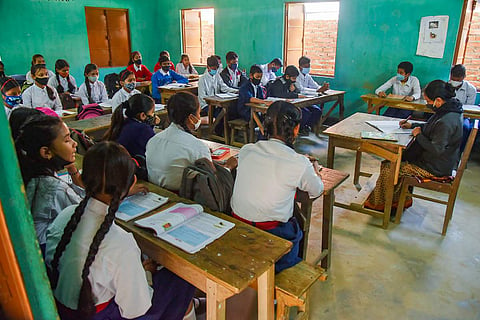

The Union government has allocated Rs 1,04,278 crore for the education sector in the Union Budget 2022 for the financial year 2022-23. This is Rs 11,054 crore higher than the amount allocated to the education sector in the financial year 2021-22. Last year, the Union Budget allocated an amount of Rs 93,224 crore to the education sector. However, this budgeted estimate was revised to Rs 88,002 crore (Revised Estimate). This indicates an increase in the budgetary allocation for education by 11.86%.
An amount of Rs 63,449.37 crore has been allocated to the Department of School Education and Literacy. For the Department of Higher Education, an amount of Rs 40810.34 crore (revenue) and Rs 18.01 crore (capital) has been allocated. In comparison, for 2021-22, the budgeted estimate for school education was Rs 54873.66 crore while the revised estimate was Rs 51969.95 crore. For higher education, the budget estimate in 2021-22 was Rs 38350.65 crore, while the revised estimate was Rs 36031.57 crore.
Although the Kothari Commission in 1965 and subsequent national education policies have consistently recommended that India must spend around 6% of the GDP on education, the allocation has consistently been much lower, hovering around 3% of the GDP in recent years. According to the Economic Survey presented by Union Finance Minister Nirmala Sitharaman on Monday, January 31, the expenditure on education as a percentage of GDP was 2.8% in 2019-20, 3.1% in 2020-21 (as per the revised estimate) and 3.1% in 2021-22 (as per the budget estimate).
Some of the other announcements related to education made during Finance Minister Nirmala Sitharaman’s Budget 2022 speech are:
> A proposal to set up a digital university to provide education in different Indian languages that will be built on a hub and spoke model. “A Digital University will be established to provide access to students across the country for world-class quality universal education with personalised learning experience at their doorsteps … The best public universities and institutions in the country will collaborate as a network of hub-spokes,” Nirmala Sitharaman said in her speech.
> One-class-one-TV channel will be implemented to provide supplementary education to children in Classes 1 to 12, to make up for the loss of formal education due to the COVID-19 pandemic. “Due to the pandemic-induced closure of schools, our children, particularly in the rural areas, and those from Scheduled Castes and Scheduled Tribes and other weaker sections, have lost almost two years of formal education,” the Finance Minister noted. The one class-one TV channel programme of the PM eVIDYA scheme will be expanded from 12 to 200 TV channels, she said, to enable all states to provide supplementary education in regional languages for classes 1-12.
> High-quality e-content in all spoken languages will be developed for delivery via internet, mobile phones, TV and radio through Digital Teachers. “A competitive mechanism for development of quality e-content by the teachers will be set-up to empower and equip them with digital tools of teaching and facilitate better learning outcomes,” Nirmala Sitharaman said.
> Virtual labs will be set up for vocational training. “In vocational courses, to promote crucial critical thinking skills, to give space for creativity, 750 virtual labs in science and mathematics, and 75 skilling e-labs for simulated learning environments, will be set-up in 2022-23,” the Finance Minister said.
The Finance Minister also announced that an e-portal, called the Digital Ecosystem for Skilling and Livelihood or 'DESH-Stack' will be launched to empower citizens to skill, reskill or upskill through online training. Sitharaman announced that 750 virtual labs in science and mathematics, as well as 75 skilling e-labs for a simulated learning environment, will be set up in 2022-23 to promote critical thinking skills and to give space for creativity.